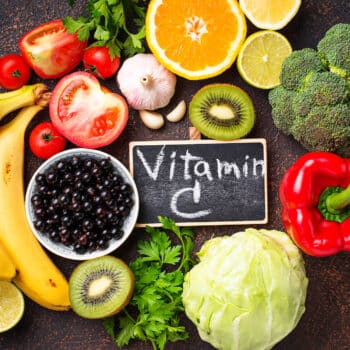Where Do We Get Vitamin C?
Vitamin C, also known as ascorbic acid, is readily available in nature. Many plants and animals are able to synthesize ascorbic acid as needed. However, because we lack the enzyme gulonolactone oxidase, humans are one of few species that cannot manufacture vitamin C on our own.
Another problem we face is that often our modern, western diets deprive us of the vitamin C we need. Processed foods and high temperatures break down this micronutrient. So, if we rely on fast food diets and heavily cooked meals rather than fresh fruits and vegetables, we may not receive the proper amount of vitamin C our bodies require to work most effectively.
Fortunately, the world is full of fruits and vegetables rich with vitamin C. With some strategic thought and careful planning, we find it is not difficult to incorporate vitamin C into our diets. Foods that provide high levels of vitamin C include:
- Peppers (red and green)
- Sweet potatoes
- Citrus fruits
- Cantaloupe
- Broccoli
- Tomato juice
- Asparagus
What Benefits Does My Body Get from Vitamin C?
As a critical micronutrient, vitamin C provides numerous health benefits when proper levels are established in the body. Early sailors gained medical insight that helped determine that citrus fruits, high in vitamin C, would prevent scurvy. Now, we are learning more about the properties of ascorbic acid that provide additional defenses against a greater number of illnesses and adverse conditions. This micronutrient contributes toward many aspects of a healthy life, including:
- Vitamin C is an antioxidant – along with other micronutrients like beta carotene and vitamin E, vitamin C eliminates free radicals inside the cells and promotes cell integrity while reducing contamination and damage.
- Vitamin C boosts the immune system – not only does vitamin C increase immunity to viruses and illnesses such as colds and flu, it lessens inflammation to aid in faster healing.
- Vitamin C enhances the nervous system – while influencing the maturation of neurons, vitamin C also aids the development of the myelin sheath that surrounds them and bolsters their ability to pass messages from one to another.
- Vitamin C lowers blood pressure – acting as a diuretic, vitamin C encourages our kidneys to discharge more water and sodium. This action has the added benefit of relaxing the walls of our blood vessels, also lowering our blood pressure.
- Vitamin C promotes skin health – making use of foods rich in omega-3, vitamin C encourages the development of the protein collagen, which results in healthier skin and hair.
- Vitamin C helps absorb iron – lowering the chance of developing anemia, vitamin C boosts the body’s ability to absorb iron from seeds and grains.
- Vitamin C builds mental health – along with resisting illness, vitamin C provides a boost of energy, which can directly affect mental health. People with sufficient levels of vitamin C generally suffer less from depression and weariness.
What if I Don’t Get Enough Vitamin C?
As noted above, it can be easy to slip into a vitamin C deficiency because of the nature of our diet in the western world. Other considerations inhibit the body’s ability to maintain adequate vitamin C levels. Alcohol consumption, smoking, and environmental factors such as air pollution can all contribute toward oxidative stress, which all increase the demand for ascorbic acid.
When our bodies lack adequate vitamin C support, there are a number of undesirable outcomes, including:
- Depression
- Cognitive impairment
- Moodiness
- Fatigue
- Impaired wound healing
- Reduced immune system
- Gingivitis
- Dry, rough skin
Current studies are exploring how vitamin C may help to prevent neural loss in certain patients. Though conclusions are developing, Vitamin C has been shown to mitigate oxidative stress that is common in dementia, Alzheimer’s, and other neurodegenerative diseases.
What Can I Do to Ensure I Have Sufficient Vitamin C?
The best place to start in vitamin C intake is your diet. Be sure to include fresh fruits and vegetables as well as the other foods listed above. Supplements are a good secondary source of vitamin C when a diet does not provide enough of this vitamin by itself. If you feel you are suffering any of the symptoms of low vitamin C, we at Bridgepoint Clinics are ready to help.
Our team of trained professionals is ready to conduct a thorough analysis of your condition. We have the tools and experience to ask questions and follow the procedures that will diagnose the true root cause of any health concern.
Once we determine the cause of your situation, we apply our knowledge to develop a plan for healing. Whether through dietary changes, physical activities, or any necessary therapy, our scientific staff will guide you through the steps of our plan toward the healthy lifestyle you deserve.
Contact us today to schedule an initial consultation and re-join the ranks of those living a healthy and normal lifestyle.
Resources:
https://www.mayoclinic.org/healthy-lifestyle/nutrition-and-healthy-eating/expert-answers/benefits-vitamin-c/faq-20058271
https://www.dnafit.com/advice/nutrition/7-health-benefits-of-vitamin-c.asp
https://conductscience.com/maze/vitamin-c-depression-and-cognition/
https://www.psychologytoday.com/gb/articles/201801/the-cognitive-benefits-vitamin-c
https://www.nutraingredients.com/Article/2022/03/07/Lack-of-vitamin-C-related-to-low-mental-vitality-says-study
https://bmcpsychiatry.biomedcentral.com/articles/10.1186/s12888-020-02730-w
<<Back to Micronutrient Center


